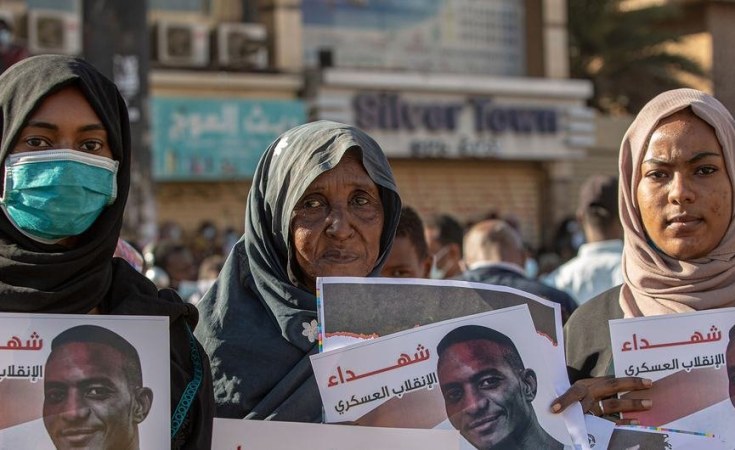Washington DC — The White House has declined to invite Sudan, Mali, Guinea, and Burkina Faso, to the US-Africa Leaders Summit, to be held in Washington DC from December 13 to 15. The Biden administration, hosting the summit, has invited the head of the African Union, as well as 49 African heads of state. The US does intend to engage with civil society organisations in those countries.
Notably absent from the list of invitees to the Washington summit are the governments of Sudan, Mali, Guinea, and Burkina Faso. The US administration attributes the decision to the suspension of the membership of those countries by the African Union. However, "we have plans to involve members of their civil societies in the dialogue, and there will be a virtual part of the civil society forum during the summit to convey their voices."
The US Dept of State says that the US-Africa Leaders Summit "will demonstrate the United States' enduring commitment to Africa, and will underscore the importance of US-Africa relations and increased cooperation on shared global priorities".
In a statement ahead of the summit, US President Joe Biden said: "I look forward to working with African governments, civil society, diaspora communities across the United States, and the private sector to continue strengthening our shared vision for the future of US-Africa relations."
AU suspension
In June 2019, the African Union Peace and Security Council (AUPSC) decided to suspend the participation of Sudan in all AU activities until the effective establishment of a civilian-led government.
In an initial reaction on 15 April 2019, the AUPSC denounced the coup d'état, and gave the TMC 15 days to relinquish power to a civilian interim government, on pain of possible suspension of Sudan's AU membership. A meeting of AU leaders in Cairo on April 23 recommended allowing the junta three months to relinquish power to civilian authority, however at a subsequent meeting in Tunis on May 1, the AUPSC decided on "a final extension of 60 days".
US relations
In July this year, the US Senate confirmed John Godfrey as Ambassador Extraordinary and Plenipotentiary of the USA to Sudan in June. Sudan has been served by a deputy ambassador, making Godfrey the first fully ranked US ambassador to Sudan in 25 years.
The confirmation of Godfrey's appointment coincided with a vote by the US Congress to overwhelmingly approve a draft resolution, condemning the October 25 military coup, and voicing support for the people of Sudan.
After a distinct thaw in US-Sudan relations following the overthrow of the Al Bashir regime and a movement toward democratic transition, relations between Washington and Khartoum have been strained following the subsequent military coup d'état of October 2021.
The USA suspended all aid to Sudan following the coup, staing that "the United States is pausing assistance from the $700 million in emergency assistance appropriations of Economic Support Funds for Sudan. Those funds were intended to support the country's democratic transition as we evaluate the next step for Sudan programming."
On May 11, the US Senate passed a draft resolution "to condemn the military coup in Sudan and support the Sudanese people," and the House of Commons also unanimously passed the non-binding resolution with a quick vote without any objections.
On March 23, the US Senate's Foreign Relations Committee unanimously approved a draft resolution condemning the military coup in Sudan and calling on the US administration to impose sanctions on those responsible for the coup.
The draft resolution came two days after the US Treasury imposed sanctions on the paramilitary Central Reserve Forces (popularly called Abu Teira) that stand under the command of the police, in accordance with the Global Magnitsky Act* on serious violations of human rights.
The Treasury listed the excessively violent repression of peaceful pro-democracy protests by the security forces as the main reason.
Bilateral agreement
In November 2020, Sudan and the US signed a bilateral claims settlement to resolve "default judgements and claims based on allegations that Sudan's prior regime supported acts of terrorism". According to the agreement, Sudan had to pay $335 million, on top of approximately $72 million already paid, for distribution to victims of terrorism.
Sudan's removal from the SST list, decreed in the dying days of the Donald Trump administration, was conditional on a bilateral claims settlement signed in November 2020 to resolve "default judgements and claims based on allegations that Sudan's prior regime supported acts of terrorism". Sudan had to pay $335 million, on top of approximately $72 million already paid, for distribution to victims of terrorism.
In exchange, after payment of compensation to the families of the victims of the bombing of the destroyer USS Cole in Yemen in 2000, and the 1998 bombing of the US embassies in Dar El Salaam in Tanzania and Nairobi in Kenya, the default judgments and claims against Sudan in US courts would be dismissed, and Sudan's sovereign immunities under US law would be restored to those enjoyed by countries that have never been designated by the US as a State Sponsor of Terrorism (SST).
*The Global Magnitsky Act of 2016 authorises the US government to sanction foreign government officials worldwide who are deemed to be human rights offenders. Sanctions can include freezing their assets and banning them from entering the USA.


